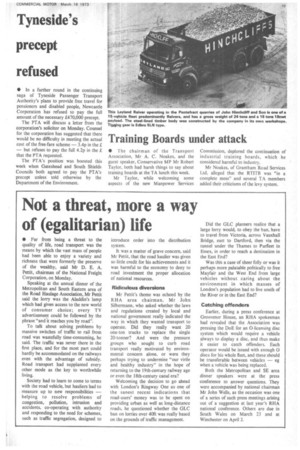Not a threat, more a way of (egalitarian) life
Page 21

If you've noticed an error in this article please click here to report it so we can fix it.
• Far from being a threat to the quality of life, road transport was the means by which the vast mass of people had been able to enjoy a variety and richness that were formerly the preserve of the wealthy, said Mr D. E. A. Pettit, chairman of the National Freight Corporation, on Monday.
Speaking at the annual dinner of the Metropolitan and South Eastern area of the Road Haulage Association, Mr Pettit said the lorry was the Aladdin's lamp which had given access to the new world of consumer choice; every TV advertisement could be followed by the phrase "and it reaches you by road".
To talk about solving problems by massive switches of traffic to rail from road was wastefully time-consuming, he said. The traffic was never there in the first place, and for the most part could hardly be accommodated on the railways even with the advantage of subsidy. Road transport had supplanted every other mode as the key to worthwhile living.
Society had to learn to come to terms with the road vehicle, but hauliers had to measure up to new responsibilities — helping to resolve problems of congestion, pollution, intrusion and accidents, co-operating with authority and responding to the need for schemes, such as traffic segregation, designed to introduce order into the distribution system.
It was a matter of grave concern, said Mr Pettit, that the road haulier was given so little credit for his achievements and it was harmful to the economy to deny to road investment the proper allocation of national resources.
Ridiculous diversions Mr Pettit's theme was echoed by the RHA area chairman, Mr John Silbermann, who asked whether the laws and regulations created by local and national government really indicated the way in which they wanted transport to operate. Did they really want 20 one-ton trucks to replace the single 20-tonner? And were the pressure groups who sought to curb road transport really motivated by environmental concern alone, or were they perhaps trying to undermine "our virile and healthy industry" in the hope of returning to the 19th-century railway age or even the 18th-century canal era?
Welcoming the decision to go ahead with London's Ringway One as one of the sanest recent indications that road-users' money was to be spent on providing urban as well as long-distance roads, he questioned whether the GLC ban on lorries over 40ft was really based on the grounds of traffic management. Did the GLC planners realize that a large lorry would, to obey the ban, have to travel from Victoria, across Vauxhall Bridge, east to Dartford, then via the tunnel under the Thames to Purfleet in Essex, in order to reach a destination in the East End?
Was this a case of sheer folly or was it perhaps more palatable politically to free Mayfair and the West End from large vehicles without caring about the environment in which masses of London's population had to live south of the River or in the East End?
Catching offenders Earlier, during a press conference at Grosvenor House, an RHA spokesman had revealed that the Association was pressing the DoE for an 0-licensing disc system which would require a vehicle always to display a disc, and thus make it easier to catch offenders. Each operator would be issued with enough 0 ,discs for his whole fleet, and these should be transferable between vehicles — eg when a vehicle was being replaced.
Both the Metropolitan and SE area dinner speakers were at the press conference to answer questions. They were accompanied by national chairman Mr John Wells, as the occasion was one of a series of such press meetings arising out of a suggestion at last year's RHA national conference. Others are due in South Wales on March 23 and at Winchester on April 2.
























































































































